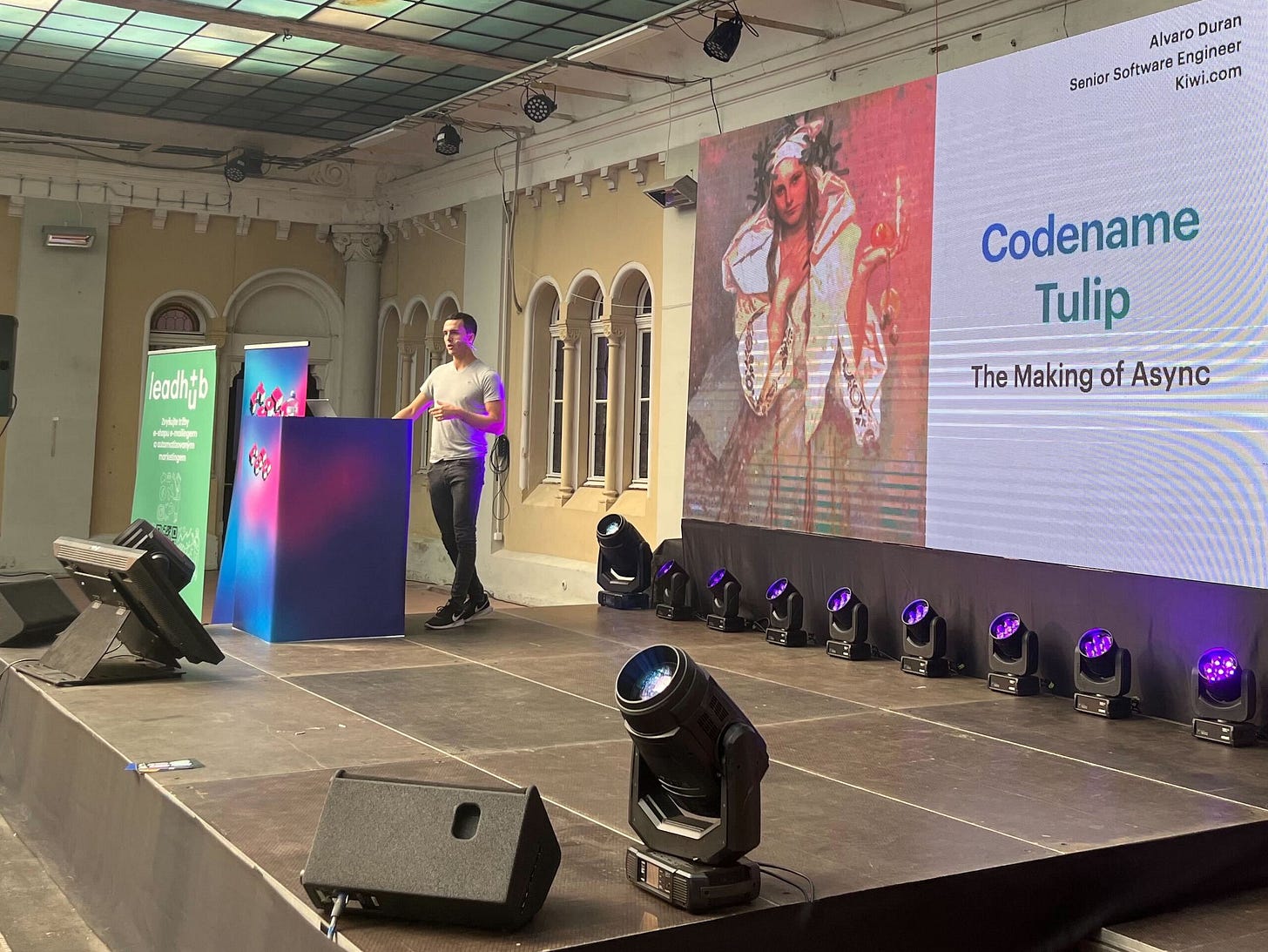The Relevance Of Tech Conferences In A Post Pandemic World
Companies that refuse to sponsor conferences do that at their own peril
Last weekend, I wrapped up this year speaker tour in Prague at PyCON CZ. The conference hit an all time record of 596 attendees. I was fortunate enough that my talk Codename Tulip: The Making of Async was accepted for the event, and based on the feedback, it was very well received.
I’ve noticed that companies are now more hesitant than they used to be when it comes to sponsoring tech conferences. Those that do sponsor are those that “get” a few things about software engineering and how it fits in the broader context of their business than those that don’t. This is particularly relevant in Europe, where tech conferences are not as consolidated as those on the other side of the pond.
Interestingly enough, companies that do sponsor are in my experience more innovative, provide better professional growth opportunities to their engineers, and spend less time and money hiring engineers as a result of a lower employee turnover.
In other words, sponsors understand how software gets written, or at least, the conditions on which software engineers are more productive.
But what does that have to do with tech conferences?
Reactive vs Proactive Thinking
If there’s something that software engineering will never run out of, is tutorials. If you believed that AI was going to change the way software engineers write software…I’m sorry to break it to you. AI has only changed the way we acquire knowledge in the context of our jobs.
From reading textbooks and asking colleagues, through searching on Stack Overflow, to prompting chatGPT, the source of our prayers has evolved over the last decades to make the process of software writing more seamless. But you’ll be hard pressed to distinguish code written by someone who found the solution on Python Cookbook, and someone who copy-pasted an error message on chatGPT’s prompt.
Who to pray has changed over time, but it’s still a prayer. A reaction against a short-term inconvenience on the engineer’s way to build that feature, or fix that bug.
This is one of the biggest reasons why there’s always a baseline level of frustration on every software engineer’s face. We spend most of our time focused on things that do not work, and for which we don’t know why.
This is not unique to software engineers, but it compounds with the particularly unstable and ever-evolving tools that engineers use to do their work. Keeping up with latest trends is not a “good to have”; it’s a must.
Software engineering is a form of thinking that often requires enough headspace to step back, look up and ponder proactively about the long-term consequences of apparently innocent design decisions. But the nature of the job is not conducive to that.
The corrosive consequence of this has a name: tech debt.
Better Than Alone With Your Thoughts
Engineers, due to COVID-19, have experienced more than other industries the shift towards working from home. And while the dust is still settling for others, we are already quite familiar with the good, the bad and the ugly of combining where you live with where you work.
Engineers often lament that they’ve been partially disconnected from, up until 2020, the mundanity of having like-minded individuals around you, eight hours a day, five days a week.
We sometimes miss being in close proximity to people with whom we could discuss unconventional topics, make unconventional jokes, being unconventionally honest. A lot of that, naturally, can be found outside of an office. But software engineering, despite its massive growth over the last years, represents only a tiny percentage of the population. Perhaps it’s just me, but people willing to talk at length about design patterns are hard to come by.
The same solitude that is helpful to achieve a state of deep concentration is also the perceived loneliness that patterned conventions of social life impinge on us. Software engineers have as a result this stereotypical blasé attitude, where everything around them is simply not that interesting, and find a quantum of solace in alternative universes that spawn from their heads, their books, and their video games.
The corrosive consequence of this also has a name: burnout.
Offsetting Non-obvious Costs
What I want you to consider is the possibility that tech conferences provide the conditions in which software engineers get to think proactively about their work, in the company of like-minded individuals with whom unconventional social patterns apply.
The possibility that you can only think long-term about the impact of your limited knowledge in a carefully designed retreat, surrounded by people intrigued by similar mysteries and forced to work in similar mental trenches.
The possibility that the tech debt avoided by an idea sparked during a tech conference, and the costs avoided by not having to replace an employee who burns out and quits, more than offsets the sponsorship of a local meetup, a local conference like PyCon CZ, or even one of the grand stages like EuroPython or PyCon US.
Only then, software engineers obtain, from the companies that work for, room to innovate, to learn and guide their learning. The employer obtains in exchange more valuable employees, with a deep fondness for a business that understands that software is not about the quantity of code produced last week, but its long-term benefits.
If you are in a position to do so, consider the possibility of sponsoring an event of the magnitude that’s relevant to your engineer’s goals.
They are often the same as yours.



